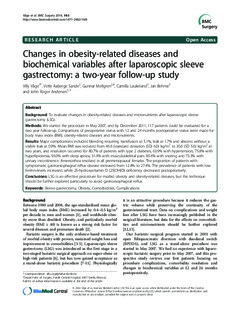Changes in obesity-related diseases and biochemical variables after laparoscopic sleeve gastrectomy: A two-year follow-up study
Våge, Villy; Sande, Vetle Aaberge; Mellgren, Gunnar; Laukeland, Camilla; Behme, Jan Horst; Andersen, John Roger
Journal article, Peer reviewed
Permanent lenke
http://hdl.handle.net/11250/2427070Utgivelsesdato
2014Metadata
Vis full innførselSamlinger
Sammendrag
Background: To evaluate changes in obesity-related diseases and micronutrients after laparoscopic sleeve gastrectomy (LSG).
Methods: We started the procedure in May 2007, and by December 2011, 117 patients could be evaluated for a two year follow-up. Comparisons of preoperative status with 12 and 24 months postoperative status were made for body mass index (BMI), obesity-related diseases and micronutrients.
Results: Major complications included bleeding requiring transfusion at 5.1%, leak at 1.7% and abscess without a visible leak at 0.9%. Mean BMI was reduced from 46.6 (standard deviation (SD) 6.0) kg/m2 to 30.6 (SD 5.6) kg/m2 at two years, and resolution occurred for 80.7% of patients with type 2 diabetes, 63.9% with hypertension, 75.8% with hyperlipidemia, 93.0% with sleep apnea, 31.4% with musculoskeletal pain, 85.4% with snoring and 73.3% with urinary incontinence. Amenorrhea resolved in all premenopausal females. The proportion of patients with symptomatic gastroesophageal reflux disease increased from 12.8% to 27.4%. The prevalence of patients with low ferritin-levels increased, while 25-hydroxyvitamin D (25(OH)D) deficiency decreased postoperatively.
Conclusions: LSG is an effective procedure for morbid obesity and obesity-related diseases, but the technique should be further explored particularly to avoid gastroesophageal reflux.

